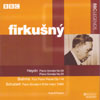Haydn; Schubert Piano Sonatas
For once the cliché is true; the pianist’s pianist recorded in a live tribute
View record and artist detailsRecord and Artist Details
Composer or Director: Franz Schubert, Joseph Haydn, Johannes Brahms
Genre:
Instrumental
Label: BBC Music Legends/IMG Artists
Magazine Review Date: 13/2006
Media Format: CD or Download
Media Runtime: 79
Mastering:
Stereo
ADD
Catalogue Number: BBCL4173-2

Tracks:
| Composition | Artist Credit |
|---|---|
| Sonata for Keyboard No. 59 |
Joseph Haydn, Composer
Joseph Haydn, Composer Rudolf Firkusný, Piano |
| Sonata for Keyboard No. 33 |
Joseph Haydn, Composer
Joseph Haydn, Composer Rudolf Firkusný, Piano |
| (4) Pieces, Movement: No. 1, Intermezzo in B minor |
Johannes Brahms, Composer
Johannes Brahms, Composer Rudolf Firkusný, Piano |
| (4) Pieces, Movement: No. 2, Intermezzo in E minor |
Johannes Brahms, Composer
Johannes Brahms, Composer Rudolf Firkusný, Piano |
| (4) Pieces, Movement: No. 3, Intermezzo in C |
Johannes Brahms, Composer
Johannes Brahms, Composer Rudolf Firkusný, Piano |
| (4) Pieces, Movement: No. 4, Rhapsody in E flat |
Johannes Brahms, Composer
Johannes Brahms, Composer Rudolf Firkusný, Piano |
| Sonata for Piano No. 21 |
Franz Schubert, Composer
Franz Schubert, Composer Rudolf Firkusný, Piano |
Author: Bryce Morrison
Rudolf Firkusny (1912-94) was a connoisseur’s pianist, his audiences invariably starred with musical celebrities. In this 1969 recital his playing shows all of his enviable stylistic elegance, fleetness and aristocratic understatement. In Haydn his tempi are exceptionally brisk but though everything is kept smartly on the move nothing sounds rushed, ill-focused or merely streamlined. This is equally true of his Brahms where, once more, there is never a hint of anything portentous or inflated. The end of the opening B minor Intermezzo, with its desolating autumnal swirl, could hardly be more rapt or sensitive. The C major Intermezzo is truly giocoso and spun off with all of Firkusny’s insouciance and only a fluffed entry to the Second Intermezzo and a momentary loss of concentration at the close of the concluding Rhapsody (Brahms’s heroic farewell to keyboard writing) are the only hints of strain.
Firkusny’s Schubert, too, is of a disarming ease and fluency though here – most notably in the central solace of the Andante – his playing is too evasive to prompt comparison with the Sonata’s greatest interpreters (Schnabel, Kempff, Curzon, Uchida, Annie Fisher, etc). Nonetheless this is a finely presented tribute to a greatly admired pianist who modestly declared: “It’s the learning, the living each day with music and recognising how little you know that keeps you motivated.”
Firkusny’s Schubert, too, is of a disarming ease and fluency though here – most notably in the central solace of the Andante – his playing is too evasive to prompt comparison with the Sonata’s greatest interpreters (Schnabel, Kempff, Curzon, Uchida, Annie Fisher, etc). Nonetheless this is a finely presented tribute to a greatly admired pianist who modestly declared: “It’s the learning, the living each day with music and recognising how little you know that keeps you motivated.”
Discover the world's largest classical music catalogue with Presto Music.

Gramophone Digital Club
- Digital Edition
- Digital Archive
- Reviews Database
- Full website access
From £8.75 / month
Subscribe
Gramophone Full Club
- Print Edition
- Digital Edition
- Digital Archive
- Reviews Database
- Full website access
From £11.00 / month
Subscribe
If you are a library, university or other organisation that would be interested in an institutional subscription to Gramophone please click here for further information.




